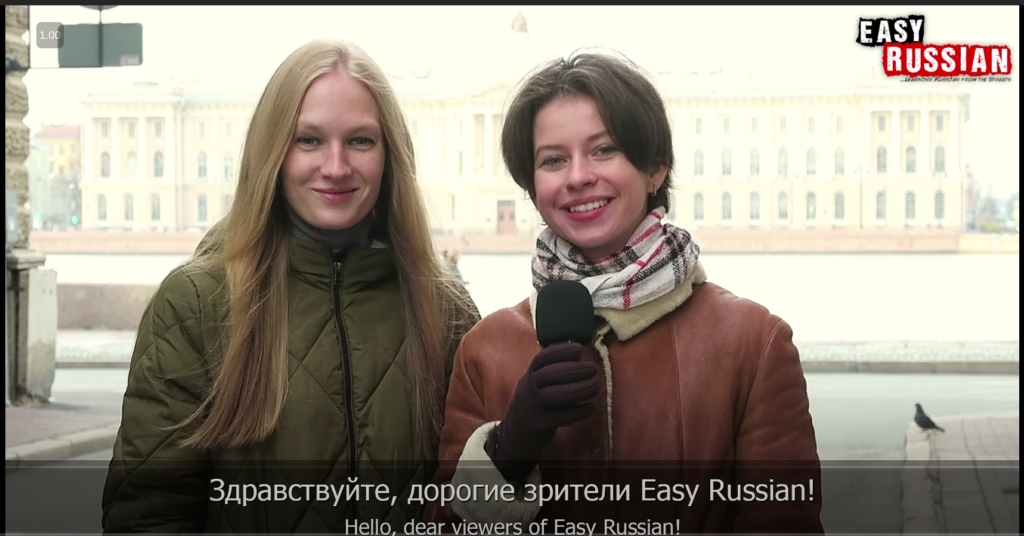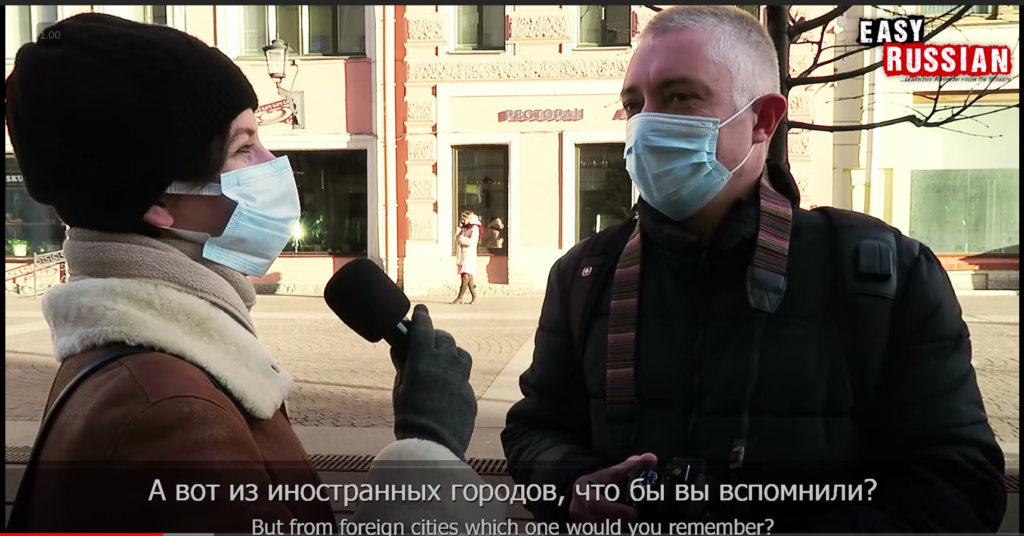Russian Subjunctive for Beginners
In this brief article, I'll take you on a journey around the Russian Subjunctive Mood. While the Indicative Mood and the Imperative Mood rarely raise any problems for language learners, the Subjunctive usually calls for a detailed explanation.
We'll focus on the use of the particle бы to express requests, likelihood, conditions, recommendations, and more. Structured in the form of a Russian lesson dialogue between a teacher and a student, this article is simple to follow.
The examples serve as great starting points for a foreigner who wants to sound like a native Russian speaker.
The English language grammar vs the Russian language grammar: бы versus would/should
- Hello, James! Welcome to today’s class on the Russian Subjunctive.
- Good morning, Piotr! That sounds complicated, like everything in the Russian language, lol.
- Well, do you know anything about the Subjunctive Mood already?
- Hmm… I guess I heard native Russian speakers use бы in place of English would. Is that correct?
-Yes. The particle бы is widely used, and its main function is to form the Subjunctive Mood in Russian. Can you think of an example?
- I would like to visit Cyprus this summer translates to Я хотел бы поехать на Кипр летом. I'm not sure if I've used the verb хотел properly here, though. I always face issues with present tenses and past tenses in Russian.
Expressing a wish or desire: Я хотел бы
- A perfect example of the Subjunctive Mood – expressing your wish in a polite form. Indeed, you have to use the past tense form of the English verb want in Russian: хотеть (infinitive) – хотел/а (past tense masculine/feminine).
Video Example #1

(00:00-00:03) Здравствуйте, дорогие зрители Easy Russian!
In this video [3:01], a young man is talking about cities he would like to visit and concludes: Unfortunately, I haven’t been to any of them, but I would like to start with Paris – К сожалению, не бывал ни в одном из них, но хотел бы начать с Парижа. Another man says: Хотелось бы в Риме побывать – And I would like to visit Rome one day [6:59].
-Do you know how to say, "It would be great to visit Cyprus this summer?"
- Why would I even want to go there? Do they have good beaches there?
- James, don’t start on that. It’s just an example.
- Fine, I’m just trying not to lose my mind over the Russian Subjunctive, lol. Could you repeat the question, Piotr?
- Yes, James. Could you say, "It would be great to visit Cyprus this summer?"
- Yes, Piotr. Should it be Было бы хорошо поехать на Кипр летом? I’m still not sure I’d like to go there though. I’d rather say Было бы хорошо поехать в Таиланд летом.
- Well, let it be Thailand, then. Whichever country makes you happy, my dear student.
- You’re the best, Piotr. Some fun never hurts, right?
- You’re right. Well, Cyprus or Thailand, было бы хорошо is the Subjunctive when you're not sure you'll make it this summer, but you're expressing your desire for this to happen, and you use the verb "to be".
- Noted.
- You see, the use of the Russian verb in the past tense (поехал)+ бы is similar to the English would+go (infinitive): I would go, but I don’t want to – Я поехал бы, но я не хочу.
- Would it then be correct to say Я помог бы тебе, но я спешу for English: I would help you, but I am in a hurry?
- Absolutely. A great example of the Russian Subjunctive, James.
- Great. I'll use this one a lot as an excuse, for sure.
Using the verb could: Я мог бы
- The particle бы is also used to indicate a possibility of something that's going to happen or a likelihood of an occurrence. In this sense, it's synonymous with the verb мочь.
- Mочь? I'm not sure I know this Russian verb. Could you conjugate it, please?
- Yes, sorry. Мочь would be conjugated as follows in the past tense: мог/могла (I/he masculine or I/she feminine) – мог (you, singular), могли (you plural or polite / they).
- It still seems confusing, just like everything else in Russian. Could you use the verb мочь in a sentence, please?
- Stop it, James. You’re a smart guy. Here you go: Я мог бы навестить тебя, но я заболел (I could have visited you, but I fell sick). You see, we use the verb мог+ the particle бы+the verb infinitive. Be careful here, as you use Past Participle in English in the same scenario. Now, would you like to give me your own example where you use the verb мочь?
- Hm…I wouldn’t like to, but I think I have to. So, We could have been friends, but he betrayed me. Should it sound like Мы могли бы были друзьями, но он мене предал?
- Almost. There's one mistake with a verb. Can you spot it yourself?
- Ah, right. It should have been Мы могли бы быть друзьями, но он мене предал. The English Past Participle becomes the Russian Infinitive here. One has to keep so many things in mind. Unbelievable. Let me ask one more question: does this use in Russian, like in English, refer to something that could have happened but never happened?
- Exactly! You're expressing a lost possibility or a regret in this case.
- Bingo! I’m finally getting there.
Using бы for requests: Ты бы не?
Listen, Piotr, I might be wrong, but I think I also heard Russian native speakers use бы a lot when they ask for something. I can't remember a proper sentence now, but I believe it's used with requests.
- Thank you for pointing this out, James! Yes, бы serves for making requests. In English, you replace the Imperative Mood with would / could to sound polite: Pass me the bread! – Could you pass me the bread, please? The same applies to Russian. Do you think you could say this sentence in Russian without my further assistance and whining?
- Let’s try. So, the impolite version would be the Imperative Mood Передай мне хлеб! And the polite one would make use of бы: Вы бы не передать мне хлеб?
- You're repeating your typical mistake with verbs, James. Please fix the verb tense.
- Right. Вы бы не передали мне хлеб? I keep forgetting that native Russian speakers use past tense verbs after бы.
Video Example #2

(2:00-2:03) А вот из иностранных городов, что бы вы вспомнили?
- Right. You could also check this video with people talking about their favorite cities. The interviewer makes the following request here [0:58]: А вы не могли бы про каждый [город] рассказать? (Could you tell us a bit more about each [city] of them?) or here [2:02]: …что бы вы вспомнили? (…which one would you remember?). It's always easier to learn Russian grammar in context.
- So you’re giving me homework again.
- James, stop it. That’s a short video, not real homework.
Using бы for recommendations: You should vs Тебе бы
- Are these all the uses of the Subjunctive Mood in Russian?
- Unfortunately not. The Russian language is complex, and its grammar may be tricky. So, I'd also like to explain to you how to use бы for recommendations. It's similar to how you use should in English: You should take a few days off – Тебе бы взять пару дней выходных. An interesting fact: as the Russian word order is rather voluntary and the verb has no fixed position, we can also say Взять бы тебе пару дней выходных. The latter sentence places a stronger emphasis on one's need to have some rest. All in all, we all need a proper rest, right?
- That’s true. I need some rest from Russian today, too. Anyway, I was also wondering whether this rule applies to negations in Russian.
- Yes, absolutely. For instance, you can say Ты бы не кричал на ребенка, а обнял его! –You shouldn’t shout at the child – hug him instead.
- As I can see, we use a past tense verb again after бы.
- A great observation, James! I think you're starting to pick up on many aspects of the Subjunctive Mood. You’re smarter than you pretend to be.
Using бы the English "I hope not to"
Now, we've approached my favorite case of using the particle бы for the Subjunctive Mood: i.e. for English I hope not to.
- That sounds complicated.
- Don’t start whining again, James. You’ll understand it when you see an example. Imagine a situation. Your plane takes off in two hours, but you're stuck in a traffic jam. You're afraid you might be late. You say: I hope not to be late. In Russian, it would sound as Не опоздать бы мне. Quite a common situation, isn’t it?
- A typical one for me, Piotr, I must say.
- For me as well, James. What is also interesting about this case is that you use the infinitive for the Russian verb, just as in English.
- While I finally made a mental note to use the past tense verb all the time, Russian grammar never gets easy. lol.
- Welcome to the world of Slavic languages, pal. That's why you take Russian lessons - to learn Russian with all its complexities, right?
Russian particle бы for English Conditionals
- Don’t get discouraged, James! I have some good news too.
- Oh, finally!
- Yeah, I’m afraid I'll lose you after this lesson unless I give you an easy rule, lol. Think about the English Conditional Mood. There are as many as four types of conditional clauses in English. For types two and three, you have distinct structures, right? In Russian, there is just one, instead.
- Are you sure that’s good news? It seems confusing.
- Okay, let’s look at the following examples to make the point clear:
1) If I were rich, I could buy a house of my dreams – Если бы я был богат, я купил бы дом своей мечты.
2) If I had passed the exam, I would have received a degree - Если бы я сдал екзамен, я получил бы диплом.
Even for the Mixed Conditional in English (every student’s nightmare), the Russian language would only offer the particle бы:
If I had learnt German in school, I would be able to communicate with you - Если бы я учил немецкий в школе, я мог бы с тобою общаться.
-You see, you don't need to remember many grammar rules for each type in Russian. You just use the particle бы and a verb in the past tense in each of these subordinate clauses.
-Yes. That's a good piece of news, indeed.
Conditional Mood and Subjunctive Mood: inversion
Just like in English, inversion is possible in Russian in all the above cases:
1) Were I rich, I could buy a house of my dreams – Был бы я богат, я купил бы дом своей мечты.
2) Had I passed the exam, I would have received a degree - Сдал бы я екзамен, я получил бы диплом.
3) Had I learnt German in school, I would be able to communicate with you. - Учил бы я немецкий в школе, я мог бы с тобою общаться.
- Okay, these examples seem easy. Is that everything? My head is boiling, lol. I like learning Russian, but Мне бы немного отдохнуть from subjunctive verbs.
- Well done with the use of бы, James! Sure, You should have some rest now. Let's call it a day.
- Thanks, Piotr! I would need a few days to digest this information, but your input has helped me understand the basics of the Subjunctive Mood.
You'll get there
I hope the article was interesting and helpful for you. As complex as Russian grammar may seem at first, it gradually becomes easy when you practice. So, don't get discouraged if you still make mistakes. You'll get there!






